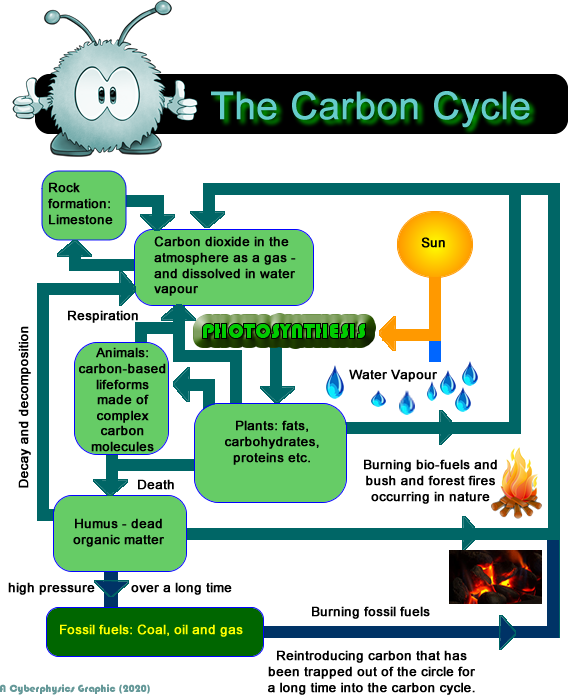Biomass Biomass is biological matter (anything that 'recently' lived - by 'recently' I mean within the last few thousand years!). Biomass makes excellent fuel as it is made up of carbon based complex molecules that generally react exothermically with oxygen (burn!!!). This process is easier if the biological material has completely dried out and lost all of its water content. Before the Industrial Revolution biomass was the primary source of fuel - since then it has been overtaken by the use of fossil fuels. Recently, due to concerns over Global Warming biomass has regained ground. Although CO2 goes into the atmosphere when biomass is burned it does not contribute to a worrying shift in equilibrium of the carbon cycle because as the carbon products are 'new' they got their carbon from the atmosphere anyway - so it just goes back! Also, when the new biomass is formed it takes carbon in from the atmosphere - either directly, if it is a plant, or indirectly, if an animal. Examples of biomass
- camel dung
makes excellent fuel for nomads - no need to pack it! Fossil fuels are NOT biomass - biomass is made up of biological material that is in the 'rapid part' of the carbon cycle.... they are constantly cycling the carbon from the atmosphere via the carbon cycle....
Plants take carbon dioxide out of the atmosphere for photosynthesis and 'trap' it as organic matter, but respiration, decomposition of dead organic materials and burning put carbon dioxide back into the atmosphere. During the carboniferous period (over 300 million years ago) large amounts of carbon accumulated as fossil fuels (coal, peat, oils and natural gas- methane).The "fossil fuels" box was getting bigger and bigger. The other boxes were getting smaller. It took millions of years to make these fuels, but we are burning them all up in a few hundred years. This is upsetting the balance of carbon in the cycle. At present the "fossil fuels" box is getting smaller; we are burning it all. At the same time the "atmosphere" box is getting bigger; i.e. carbon dioxide is being added to the atmosphere. This gas contributes to the "green house effect" and therefore to the problem of "global warming". The biomass part of the cycle is quite rapid - animal and plant life cycles are relatively short. The 'fossil fuels' box is in a section of the cycle that is slow running and requires organic matter to be sealed off from the atmosphere. There is grave concern that simply increasing the plant life on the planet will not shift the equilibrium far enough to prevent rapid global warming. Deforestation and burning of vast areas of land are human activities that are affecting the balance of the carbon cycle but they are not as unsolvable as the problem of putting vast quantities of fossil fuel carbon back into the atmosphere, that had until recently been effectively trapped out of the biomass part of the cycle. We are now trying to correct the change in carbon dioxide in our atmosphere - see BACCS |
Follow me...
|







